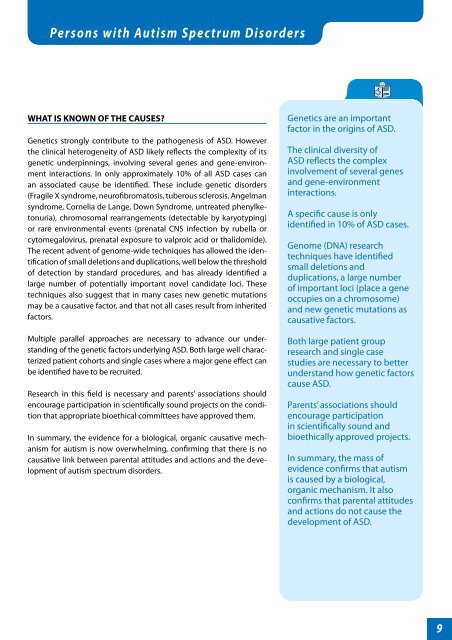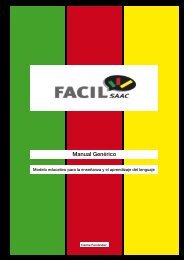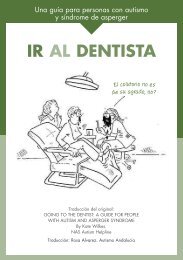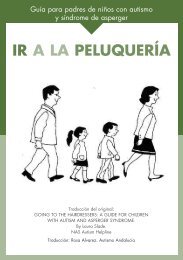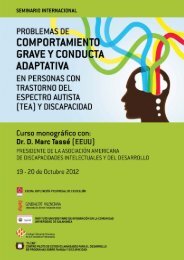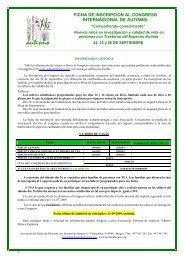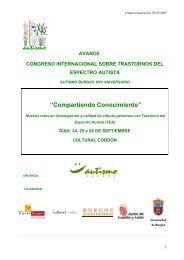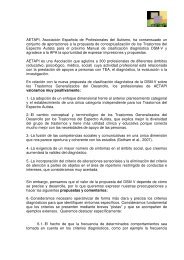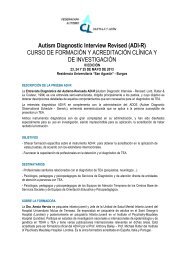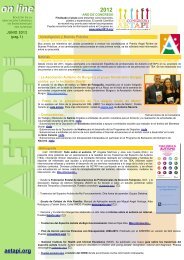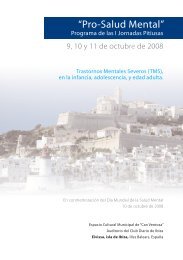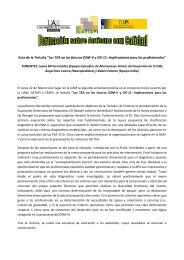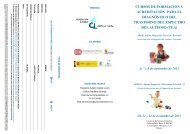persons with autism spectrum disorders - Aetapi
persons with autism spectrum disorders - Aetapi
persons with autism spectrum disorders - Aetapi
Create successful ePaper yourself
Turn your PDF publications into a flip-book with our unique Google optimized e-Paper software.
Persons <strong>with</strong> Autism Spectrum Disorders<br />
WHAT IS KNOWN OF THE CAUSES?<br />
Genetics strongly contribute to the pathogenesis of ASD. However<br />
the clinical heterogeneity of ASD likely reflects the complexity of its<br />
genetic underpinnings, involving several genes and gene-environment<br />
interactions. In only approximately 10% of all ASD cases can<br />
an associated cause be identified. These include genetic <strong>disorders</strong><br />
(Fragile X syndrome, neurofibromatosis, tuberous sclerosis, Angelman<br />
syndrome, Cornelia de Lange, Down Syndrome, untreated phenylketonuria),<br />
chromosomal rearrangements (detectable by karyotyping)<br />
or rare environmental events (prenatal CNS infection by rubella or<br />
cytomegalovirus, prenatal exposure to valproic acid or thalidomide).<br />
The recent advent of genome-wide techniques has allowed the identification<br />
of small deletions and duplications, well below the threshold<br />
of detection by standard procedures, and has already identified a<br />
large number of potentially important novel candidate loci. These<br />
techniques also suggest that in many cases new genetic mutations<br />
may be a causative factor, and that not all cases result from inherited<br />
factors.<br />
Multiple parallel approaches are necessary to advance our understanding<br />
of the genetic factors underlying ASD. Both large well characterized<br />
patient cohorts and single cases where a major gene effect can<br />
be identified have to be recruited.<br />
Research in this field is necessary and parents’ associations should<br />
encourage participation in scientifically sound projects on the condition<br />
that appropriate bioethical committees have approved them.<br />
In summary, the evidence for a biological, organic causative mechanism<br />
for <strong>autism</strong> is now overwhelming, confirming that there is no<br />
causative link between parental attitudes and actions and the development<br />
of <strong>autism</strong> <strong>spectrum</strong> <strong>disorders</strong>.<br />
Genetics are an important<br />
factor in the origins of ASD.<br />
The clinical diversity of<br />
ASD reflects the complex<br />
involvement of several genes<br />
and gene-environment<br />
interactions.<br />
A specific cause is only<br />
identified in 10% of ASD cases.<br />
Genome (DNA) research<br />
techniques have identified<br />
small deletions and<br />
duplications, a large number<br />
of important loci (place a gene<br />
occupies on a chromosome)<br />
and new genetic mutations as<br />
causative factors.<br />
Both large patient group<br />
research and single case<br />
studies are necessary to better<br />
understand how genetic factors<br />
cause ASD.<br />
Parents’ associations should<br />
encourage participation<br />
in scientifically sound and<br />
bioethically approved projects.<br />
In summary, the mass of<br />
evidence confirms that <strong>autism</strong><br />
is caused by a biological,<br />
organic mechanism. It also<br />
confirms that parental attitudes<br />
and actions do not cause the<br />
development of ASD.<br />
9


